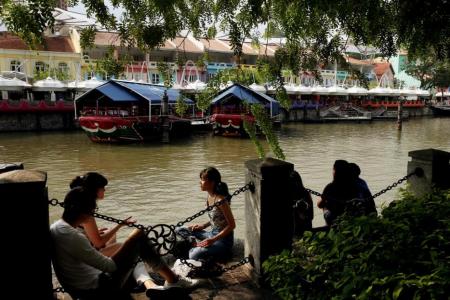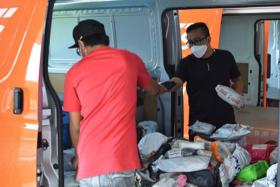Local businesses to get funding to improve their areas
They can get up to $500,000 a year under pilot scheme
From car-free zones to regular arts events and cleaner environments, pockets of precincts in Singapore could look livelier, with the Government giving local businesses up to $500,000 a year to improve their areas.
It will match them dollar-for-dollar during the first four years of a pilot scheme.
The Business Improvement District (BIDs) scheme will start as a pilot but could eventually be formalised depending on interest, said Minister for National Development Lawrence Wong on Tuesday (Sept 5).
The Urban Redevelopment Authority (URA) is inviting stakeholders - such as property owners - to submit proposals for four-year "business plans" to improve their precincts.
"I don't think government-led programmes will be able to fully capture the unique characteristics and flavours of our diverse local areas," Mr Wong said.
"For place management to be effective, we really need ground-up ownership and participation, especially from local businesses and stakeholders who are more familiar with the local identity and needs of the precinct."
Singapore's first BID, Singapore River One, was formed in April.
Local stakeholders pay a "membership fee" which goes into a common pool that funds initiatives within the precinct.
They must then submit their proposals on how their districts can be improved by March 31 next year.
Once the proposal is accepted, stakeholders need to develop a business plan supported by at least 51 per cent of property owners in the precinct, who must in turn raise 51 per cent of the total potential contribution amount.
At the moment, most examples of "place management" in Singapore - area-based, multi-stakeholder approaches to improving precincts and making them more attractive - rely on voluntary contributions.
This means that funding is less certain, in turn making it more difficult for some precincts to sustain long-term business plans, the URA said.
The authority added that there has been a free-rider problem as some stakeholders do not contribute but still benefit.
To tackle these issues, the URA has been engaging precinct associations over the last two years to seek feedback on the idea of a BID model.
POSITIVE OUTCOMES
URA's group director for conservation and urban design Chou Mei said: "It is when communities are in charge that we see the most positive outcomes - as they know what's best for their precincts."
For place management to be effective, we really need ground-up ownership and participation, especially from local businesses and stakeholders who are more familiar with the local identity and needs of the precinct.Minister for National Development Lawrence Wong
Mr Saeid Labbafi, chairman of the One Kampong Gelam (OKG) precinct association, plans to pursue the pilot BID.
Noting that this would "increase business activities" in the area, he added that they were in the process of collecting information to help engage stakeholders and make them more aware of the benefits of getting involved.
Mr Labbafi received the Place Champion Award 2017 from Mr Wong yesterday, in recognition of his efforts to lead stakeholders in initiatives that attracted footfall to the precinct - such as regular weekend car-free zones at several roads.
If OKG successfully gets on board the BID scheme, Mr Labbafi hopes to see a Kampong Glam that has more arts and fashion events, and is cleaner and more beautiful - perhaps with more traditional tiling, better-maintained facades and attractive-looking rubbish bins.
He added: "If the entire Kampong Glam became a car-free zone, the (effects of the) BID scheme would become even more powerful."
Get The New Paper on your phone with the free TNP app. Download from the Apple App Store or Google Play Store now


